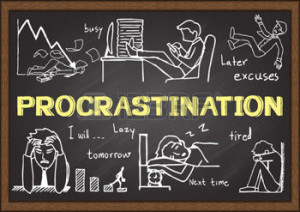Changing how adults with ADHD talk to themselves is one of the easiest and powerful ways to overcome procrastination. Procrastination is something many adults with ADHD deal with. Although it can be difficult it is not impossible. Self –talk is a great way to stop procrastinating and change your life. Self-talk can assist you from a procrastinator into a doer. Let’s see how this can help you when it comes too procrastination.
The Procrastinator Slogan
Think about the following thought, which for sure has crossed our minds in the past “I have to finish this long, important project. It should be already done by now and I need to get through it.” For me, no other saying embodies a procrastinators mind, as we will see that this innocent thought will block every mental block that encourages procrastination. That is why I like to call it the procrastination slogan. We all use the procrastination slogan (or various types of it) every once in a while. However, if you are a chronic procrastinator, the chances are you are more likely to repeat it frequently or even daily. But what is so wrong about the procrastinators’ slogan? In what ways do these words encourage procrastination and what can you do about it. To understand what is wrong with the procrastination slogan, let’s break it down into parts
- I have to – I choose to – “I have to” is every procrastinator’s favorite expression. It is the most disempowering. Every time that you say that you have to do something, it implies that you don’t have any choice. This choice of words implies that you feel forced to do the task that you really don’t want to do. This perception elicits the strong resistance to do the task. The solution to this problem is to change “I have to” to “I choose to”. Everything that you do is a choice, and using language that expresses choice reminds you of that and brings back the feeling of empowerment.
- Finish – Start – Visualizing a finished project can very motivating for many people, but from an adult with ADHD point of view who has a hard time even starting a project, visualizing the finished project can be overwhelming and even depressing at times. The solution in this case is not to focus on finishing but starting. Forget about the finish line and just concentrate on taking that first step. Bring your focus from the future to what can be done right now. We all know that when you start something a number of times you will eventually finish the task.
- Long Project -> Short Project- Constantly reminding yourself of how long and challenging an upcoming project is taking only will add to the feeling of overwhelm and thus procrastination. Any project no matter how mundane it maybe be can be broken down into small chunks. Ignore the big picture and just tackle the small chunks.
- An Important Project -> Imperfect Step- Setting high hope on a project only adds to anxiety and fear of failure. Perfectionism arises and fuels procrastination even more. The way to overcome this mental block is to give you permission to be human. Allow yourself to be imperfect on small tasks and remember that you can always refine your work later
- It Should Be Done By Now -> I will feel terrific – The word should is usually connected with blame and guilt. When you say you should be doing something, you are focusing on an ideal reality with your current reality. Miss using the word should can bring on feelings of depression, failure and regret. The solution is to focus on not on how terrible you feel, but on how good you feel after you take action. Taken action (even if it small) is the best motivator I know. The trick of this is to bring feelings of accomplishment into the present moment and to remember that real joy is only a small step away.
- Need To Rush Through -> Have Plenty of Free Time – Long periods of being alone can bring on feelings of resentment and will generate feelings of resistance toward the project/task you are working on. The way to overcome this mental block is not to work long hours, but to schedule frequent breaks and small rewards along the way. When rewards are small and frequent they work wonders.
